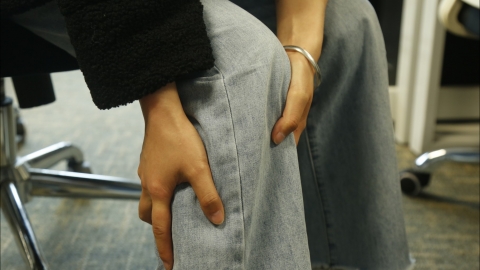What causes leg soreness, numbness, and weakness?
Generally, leg soreness, numbness, and weakness may be caused by prolonged maintenance of the same posture, excessive fatigue, iron deficiency anemia, hypokalemia, lumbar disc herniation, and other related factors. Symptomatic management such as general treatment and medication may be needed. If symptoms are severe, timely medical consultation is recommended, following the doctor's instructions for treatment. Detailed analysis is as follows:

1. Prolonged maintenance of the same posture
Remaining standing, sitting, or maintaining a single posture for a long time may lead to poor leg circulation, muscle fatigue, and consequently soreness, numbness, weakness, and aching. In severe cases, symptoms such as difficulty walking and leg swelling may occur. It is recommended to change posture regularly, and the use of heat compress or massage may help improve circulation and relieve muscle fatigue.
2. Excessive fatigue
After intense exercise or prolonged walking, leg muscles may accumulate a large amount of lactic acid. Lactic acid buildup can stimulate the muscles, causing soreness, while muscle fatigue can lead to a feeling of weakness, possibly accompanied by muscle stiffness and localized tenderness. It is recommended to ensure sufficient rest and avoid further physical activity.
3. Iron deficiency anemia
Long-term selective or picky eating habits may induce iron deficiency anemia. This condition reduces the amount of hemoglobin, impairing its ability to carry oxygen, thereby depriving muscle tissues of sufficient oxygen supply, causing fatigue, leg soreness, numbness, and weakness, possibly accompanied by pallor, palpitations, and shortness of breath. It is recommended to follow medical advice and use medications such as Compound Ferrous Sulfate Granules, Iron Dextran Tablets, or Iron Sucrose Injection to alleviate symptoms.
4. Hypokalemia
Hypokalemia is mainly caused by insufficient potassium intake, excessive potassium loss, or abnormal distribution of potassium between intracellular and extracellular compartments. Low potassium levels can reduce the excitability of muscle cells, affecting muscle contraction and nerve conduction, possibly accompanied by arrhythmia, breathing difficulties, and bloating. It is recommended to follow medical advice and use medications such as Potassium Chloride Sustained-release Tablets, Potassium Chloride Injection, or Potassium Gluconate for Injection for treatment.
5. Lumbar disc herniation
Lumbar disc herniation is mainly caused by long-term strain, trauma, and other factors. When a lumbar disc herniates, the protruding nucleus pulposus or annulus fibrosus tissue may compress the lumbar nerve roots, affecting their normal function and causing radiating pain and weakness in the lower limbs. It may also be accompanied by low back pain, sciatica, and other symptoms. It is recommended to follow medical advice and use medications such as Gentengping Granules, Yaotongning Capsules, or Duhuo Jisheng Pills to alleviate symptoms.
It is recommended to engage in moderate daily exercise, such as walking, jogging, or yoga, to help strengthen leg muscles, while avoiding overexertion.




